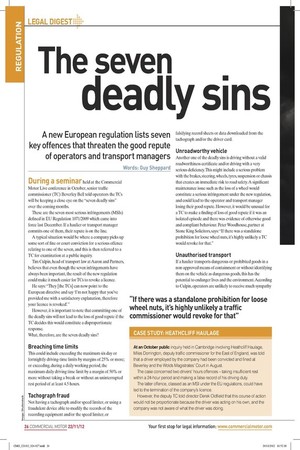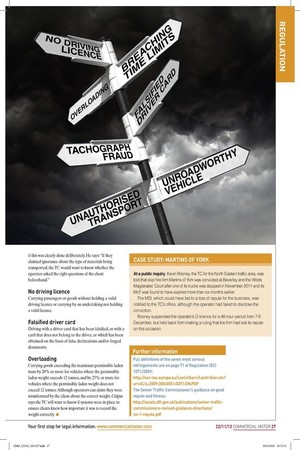The seven
Page 18

Page 19

If you've noticed an error in this article please click here to report it so we can fix it.
deadly sins
A new European regulation lists seven key offences that threaten the good repute of operators and transport managers
Words: Guy Sheppard During a seminar held at the Commercial Motor Live conference in October, senior traffic commissioner (TC) Beverley Bell told operators the TCs will be keeping a close eye on the “seven deadly sins” over the coming months.
These are the seven most serious infringements (MSIs) defined in EU Regulation 1071/2009 which came into force last December. If a haulier or transport manager commits one of them, their repute is on the line.
A typical situation would be where a company picks up some sort of fine or court conviction for a serious offence relating to one of the seven, and this is then referred to a TC for examination at a public inquiry.
Tim Culpin, head of transport law at Aaron and Partners, believes that even though the seven infringements have always been important, the result of the new regulation could make it much easier for TCs to revoke a licence.
He says: “They [the TCs] can now point to the European directive and say ‘I’m not happy that you’ve provided me with a satisfactory explanation, therefore your licence is revoked’.” However, it is important to note that committing one of the deadly sins will not lead to the loss of good repute if the TC decides this would constitute a disproportionate response.
What, therefore, are the seven deadly sins?
Breaching time limits
This could include exceeding the maximum six-day or fortnightly driving-time limits by margins of 25% or more; or exceeding, during a daily working period, the maximum daily driving time limit by a margin of 50% or more without taking a break or without an uninterrupted rest period of at least 4.5 hours.
Tachograph fraud
Not having a tachograph and/or speed limiter, or using a fraudulent device able to modify the records of the recording equipment and/or the speed limiter, or falsifying record sheets or data downloaded from the tachograph and/or the driver card.
Unroadworthy vehicle
Another one of the deadly sins is driving without a valid roadworthiness certificate and/or driving with a very serious deficiency. This might include a serious problem with the brakes, steering, wheels, tyres, suspension or chassis that creates an immediate risk to road safety. A significant maintenance issue such as the loss of a wheel would constitute a serious infringement under the new regulation, and could lead to the operator and transport manager losing their good repute. However, it would be unusual for a TC to make a finding of loss of good repute if it was an isolated episode and there was evidence of otherwise good and compliant behaviour. Peter Woodhouse, partner at Stone King Solicitors, says: “If there was a standalone prohibition for loose wheel nuts, it’s highly unlikely a TC would revoke for that.”
Unauthorised transport
If a haulier transports dangerous or prohibited goods in a non-approved means of containment or without identifying them on the vehicle as dangerous goods, this has the potential to endanger lives and the environment. According to Culpin, operators are unlikely to receive much sympathy if this was clearly done deliberately. He says: “If they claimed ignorance about the type of materials being transported, the TC would want to know whether the operator asked the right questions of the client beforehand.”
No driving licence
Carrying passengers or goods without holding a valid driving licence or carrying by an undertaking not holding a valid licence.
Falsified driver card
Driving with a driver card that has been falsified, or with a card that does not belong to the driver, or which has been obtained on the basis of false declarations and/or forged documents.
Overloading
Carrying goods exceeding the maximum permissible laden mass by 20% or more for vehicles where the permissible laden weight exceeds 12 tonnes, and by 25% or more for vehicles where the permissible laden weight does not exceed 12 tonnes. Although operators can claim they were misinformed by the client about the correct weight, Culpin says the TC will want to know if systems were in place to ensure clients knew how important it was to record the weight correctly. ■
CASE STUDY: HEATHCLIFF HAULAGE
At an October public inquiry held in Cambridge involving Heathcliff Haulage, Miles Dorrington, deputy traffic commissioner for the East of England, was told that a driver employed by the company had been convicted and fined at Beverley and the Wolds Magistrates’ Court in August.
The case concerned two drivers’ hours offences – taking insufficient rest within a 24-hour period and making a false record of his driving duty.
The latter offence, classed as an MSI under the EU regulations, could have led to the termination of the company’s licence.
However, the deputy TC told director Derek Oldfield that this course of action would not be proportionate because the driver was acting on his own, and the company was not aware of what the driver was doing.
ption caption capton
CaSE STUDy: MaRTiNS OF yORk
ptixon caption
At a public inquiry, Kevin Rooney, the TC for the North Eastern traffic area, was told that skip hire firm Martins of York was convicted at Beverley and the Wolds Magistrates’ Court after one of its trucks was stopped in November 2011 and its MoT was found to have expired more than six months earlier.
The MSI, which could have led to a loss of repute for the business, was notified to the TC’s office, although the operator had failed to disclose the conviction.
Rooney suspended the operator’s O-licence for a 48-hour period from 7-9 December, but held back from making a ruling that the firm had lost its repute on this occasion.
Further information
Full definitions of the seven most serious infringements are on page 71 of Regulation (EC) 1071/2009: http://eur-lex.europa.eu/LexUriServ/LexUriServ.do? uri=OJ:L:2009:300:0051:0071:EN:PDF The Senior Traffic Commissioner’s guidance on good repute and fitness: http://assets.dft.gov.uk/publications/senior-trafficcommissioners-revised-guidance-directions/ no-1-repute.pdf










































